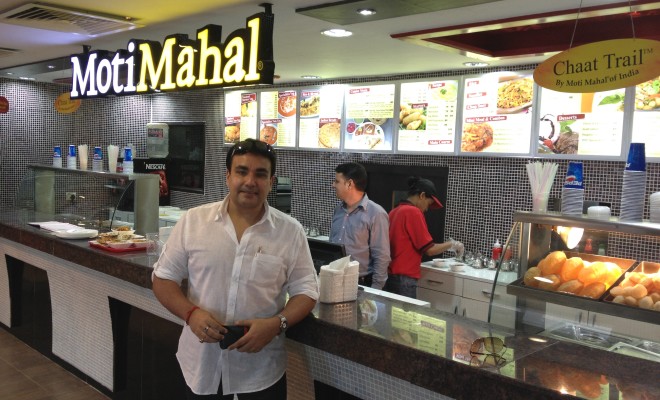Moti Mahal, an international chain of restaurants and franchises across India and the world is one of the representative face of North Indian cuisine across continents. Monish Gujral, MD, Moti Mahal is credited with the trailblazing turnaround of Moti Mahal from being a small but an iconic presence in Delhi to becoming a Multi-National Corporation that is well on its way to defining how the world eats Indian food. The man himself opens up on his personal as well as professional aspects of being a part of Moti Mahal.
How it all got started? Could you walk us through your journey of getting into restaurant business?
It started in the summer of 1983 while I was waiting for my high school results, thoroughly bored at home due to the long wait for the results and college admission. I found my way to the kitchens of Moti Mahal as a paid intern. Initially it was a little challenging being confined to the hot kitchens for long hours, but eventually it became my play area and all the chefs my friends. I trained under the watchful eyes of my legendary grandfather who insisted that I should go for early morning vegetable and fish markets to learn about the quality of the raw materials. The stint that started as a summer job eventually became a lifelong passion. I continued to learn and cook while I studied business at Delhi University for the next three years. By the time I graduated I was a fully trained chef, and the next two years while I studied hotel management I trained at the front office at Moti Mahal.
Moti Mahal is an iconic name in modern Indian culinary history. It began in 1920 as a small eatery in Peshawar in undivided India, reopening in Delhi in 1947 following the partition of the subcontinent. Its matchless signature recipes and smoky Frontier flavours soon made it a name synonymous with authentic North Indian cuisine. The restaurant soon acquired landmark status with illustrious visitors – heads of state, foreign dignitaries and Hollywood stars placing it high on their itineraries when visiting the capital.
There are only a handful of chefs in the world who may be credited with the creation of a single dish, let alone an entire cuisine. Shri Kundan Lal Gujral who founded Moti Mahal is that rare chef who conceived, created, and gave the world one of its most well-loved cuisines – Tandoori food.
I realised in the late ’80s that to keep the brand alive and rolling we needed to adapt to the changing times and expand it pan-India and globally. This posed several challenges of consistency, capital, and back-end strengthening to make my new avatar Moti Mahal scalable. Being a trained chef and having learnt all the tricks of the trade at the early age of 17, I was able to achieve my goals through sheer dedication and hard work. Besides this, since I was a keen writer I was commissioned to write columns for popular newspapers and tabloids that helped me get recognition for my brand and of course myself. I wrote a few books in the Moti Mahal trail series which were awarded the best cookbooks in the world by Gourmand. This also helped me preserve and promote our Moti Mahal culture.
What are your growth & expansion plans for Moti Mahal Deluxe?
In 2003, Monish Gujral, grandson of Shri Kundan Lal Gujral, created Moti Mahal Delux Management Services (now a private limited company) with the objective of expanding the business into franchises across India. In the following seven years, Moti Mahal grew from four stand-alone restaurants to 100 company-owned restaurants and franchises – 88 in 22 cities of India, and others in the Middle East, Canada, South East Asia, China, Europe, and the United States. That number is projected to double over the next five years, covering an area of more than half a million square feet, with plans for diversifying into other segments of the food market. We also reinvented the menu. While it remains true to its USP – the traditional Punjabi Pathani recipes, Moti Mahal has adopted multiple formats for its outlets to target different consumer segments.
We also pay particular attention to our ethics. The hallmark of the Moti Mahal ethos is its uncompromising standard of quality and consistency. It is the first food franchise in the world where all chefs and F&B staff of every franchisee unit is trained by the mother company. A contingent of back-up chefs is retained at the headquarters at all times to ensure uninterrupted consistency.
What’s Moti Mahal’s signature offering which sets your brand apart from others? Where do you see your brand in the competition?
In current scenario, most of the restaurants find it difficult to survive by the second year due to multiplicity of eating out options, cut throat competition, high real estate costs and of course, also due to consistency and quality control issues. Motimahal brand is now nearly 100 years old , not only has been credited for placing India on the world culinary map by inventing the famous tandoori chicken and legendary butter chicken but also set the trend of fine dining way back in 1940`s.
Its always good to have completion which helps you to be active, responsive and flexible to adapt to the need of the time. Otherwise one can be out of business before one realizes. We have positioned our restaurants as contemporary casual fine dine serving comfort food and above all which we had only pioneered.
Which format according to you will thrive in 2016? What are the trends to look out for in the year 2016?
2013 to 2015 was the fusion and modernistic Indian cuisine trend. I think in 2016 we will see casual Bistros, pubs and restaurants serving comfort food with contemporary setting will rule the cuisine market. There will also be some additional space for regional cuisines in 2016.
How has your journey been with NRAI?
NRAI is a unique platform for restaurateurs to share their experiences and to address their problems on a common platform. Being a part of the managing committee, working with great industry minds to evaluate and address common issue on a pan Indian scale it has been a great experience.
How do you keep a balance between your personal and professional life? What do you do to unwind yourself?
“One bad email can spoil your entire evening “This I learnt long back so as a rule once back at home in the evening my official mobile is off and only key people can reach me for emergencies at work. I believe ones family is the most important gift one has and we must cherish and enjoy it uninterrupted. We must be able to enjoy our family and have time for our hobbies to be able to achieve balance in life and professional success, so I give my undivided to my family in my free time. I love cooking its like mediation to me and love to occasionally make a meal for my kids. Being a food columnist and an author I enjoy writing for my blog and columns in my time.
What are your major learnings as a restaurateur?
When we were graduating from hotel management our professor told us that you all will be working when the world will be enjoying and partying .That time I thought how boring it would be attending to others on a national holiday or Sunday or even on a new year, in your restaurants but gradually the work place became my play ground and I learn to enjoy with different people from all walks of life, interacting with them broadened my thought process. I graduated as a person in this trade
One tip/advice you would like to offer to young entrepreneurs aspiring to enter in restaurant business?
Everything follows passion. Be passionate about your work. Don’t be misled with the glamour attached to this business. Its hard work and as a restaurateur one must have adequate culinary knowledge so as not to be misled by anyone .I had learn long back to be successful in this business its not making the best dish once but to be able to make it again and again with same consistency and quality.
What is one industry issue that has been bothering you as a restaurateur for long? What are your suggestions to cope up with it?
Licensing, especially the liquor license to be eased a little in all states and made affordable. Secondly we need more professionalism in our industry there is shortage of qualified F&B staff, especially in small towns. We need to have more vocational colleges to educate and motivate young brigade to qualify and join the system, although government has started skill development on national level which is highly applaudable.


